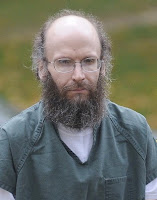Knowing that our book club was reading "The Man Who Quit Money", a librarian friend suggested that I read "The Stranger in the Woods"- another true story.
I was repelled by this book when I first started it, because this man, Christopher Knight, lived his solitary life by stealing. He lived alone in the woods of Maine for 27 years, beginning at age 20, never speaking to one person.
However, I am glad that I continued because it is a most interesting portrayal of a hermit, a person who does not want to interact with anyone anytime, but is closely connected to nature.
"He knows the season, intimately, its every gradation. He knows the moon, a sliver less than half tonight, wanning."
The author of this book, Michael Finkel, did great research on solitary living. Not just a simpler life, but a solitary life. He tried to help the reader understand not only Christopher Knight but this important question: "What makes a good life?"
"People have sought out solitary existences at all times across all cultures, some revered, and some despised".
Would you believe that our desire to be alone may be partly genetic? The author read a study about brain chemicals called 'pituitary peptide oxytocin' and 'vasopressin', describing how the presence or absence of these chemicals explains why some people need and want more or fewer interpersonal relationships. Now that's interesting, don't you think?
The author gives 3 reasons for withdrawal from society: pilgrims, protesters, and pursuers.
Pilgrims are religious hermits believing that seclusion leads to spiritual awakening. There are 4 million in India.
Protesters are disillusioned with the world- wars, environmental destruction, evil people, etc. There are 1 million protester hermits in Japan at present rejecting Japan's present culture.
Pursuers are writers, painters, scientists, and philosophers (like Thoreau) "Not till we have lost the world do we begin to find ourselves".

As interesting as this is, it still doesn't describe "The Stranger In The Woods". The missing piece for me was the fact that, when he was no longer able to live in the woods, he was believed to have either autism or schizoid personality. Sadly, he had great difficulty living back in society. All he wanted in life was to live and die in the woods. What does make a good life?


















